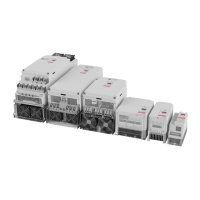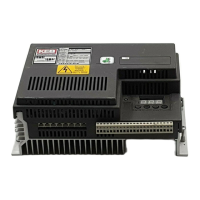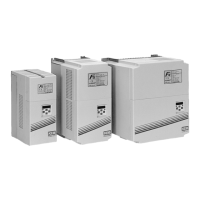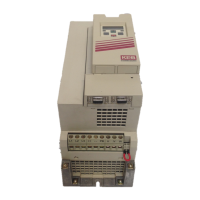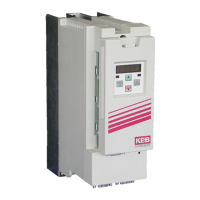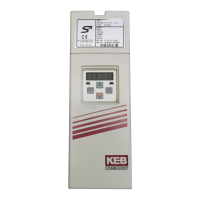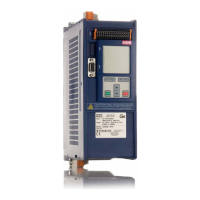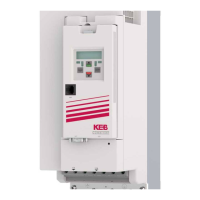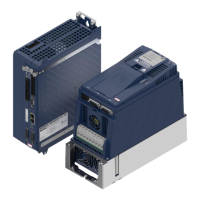Do you have a question about the KEB COMBIVERT F6 Series and is the answer not in the manual?
Specifies qualifications required for personnel using the manual.
Guidelines for handling and storing the drive converters.
Safety precautions during installation, including handling sharp edges and weight.
Safety warnings related to electrical connections and voltage.
Responsibility for EMC limit values and notes on installation.
Information on voltage testing and insulation measurement procedures.
Instructions for safe start-up, programming, and operation.
Procedures for regular maintenance and checks.
Warnings on unauthorized repairs and information on proper disposal.
Defines the intended use of the COMBIVERT for motor control.
Lists potential risks and unexpected operating conditions.
Details prohibited operations and consequences.
Lists key features of the COMBIVERT F6 series.
Explains the structure and meaning of the part code.
Details the information provided on the device nameplate.
Explains feature values and their meanings for configuration.
Covers environmental conditions for operation, storage, and transport.
Specifies temperature, humidity, and altitude requirements.
Details vibration limits, shock values, and pressure.
Lists requirements regarding contamination from gases and solids.
Covers device classification and EMC requirements.
Specifies overvoltage category and pollution degree.
Lists EMC emitted interference and immunity requirements.
Provides a summary of technical data for 400V devices.
Provides a summary of technical data for 400V devices.
Details voltage/frequency specs and motor voltage calculation example.
Lists input/output currents, overload capacities, and software limits.
Explains overload behavior and thermal limits.
Details current limits dependent on switching and output frequencies.
Covers power dissipation, fuses, and short-circuit capacity.
Covers general electrical specifications.
Explains how switching frequency is adjusted based on heat sink temperature.
Describes the function of the DC link and braking transistor.
Provides technical data for sub-mounted braking resistors.
Details fan specifications, switching behavior, and points.
Illustrates the airflow path within the drive converter.
Provides physical dimensions and weight information.
Provides dimensions and weight for built-in air and water-cooled versions.
Dimensions and weight for push-through air-cooled units.
Dimensions and weight for push-through water-cooled units.
Dimensions and weight for push-through oil-cooled units.
Explains installation requirements for IP54-ready devices.
Covers mounting instructions and distances for control cabinet installation.
Specifies mounting materials and tightening torques.
Details required distances for reliable operation.
Provides an overview of the COMBIVERT F6 housing and its components.
Details on connecting the power unit to the supply.
Explains how to connect the voltage supply to the unit.
Describes terminal block X1A for 400V connections.
Instructions for connecting protective and functional earth.
Details on the protective earth connection and its requirements.
Information on functional earthing for EMC requirements.
Instructions for connecting the 3-phase AC mains supply.
Diagram and notes for 3-phase AC mains connection.
Factors determining the supply cable cross-section.
Advises on service life and mains chokes for hard power systems.
Notes on DC operation and terminal block X1A for DC connection.
Details terminal block X1A for DC connections.
Instructions on wiring the motor to the drive controller.
Shows motor wiring diagram and connections.
Describes terminal block X1A for motor connections.
Discusses cable type, length, and EMC for motor lines.
Max motor cable length for different device sizes and EMC category.
Formula for calculating motor cable length for parallel operation.
Factors influencing motor cable cross-section selection.
General advice on motor interconnection and voltage peaks.
Details connections for temperature monitoring and brake control.
Instructions for connecting and using braking resistors.
Guides for installing side-mounted braking resistors.
Describes terminal block X1A for braking resistor connection.
Warnings and advice for using non-intrinsically safe braking resistors.
Lists available accessories like filters, chokes, and seals.
Lists available filters and chokes for different device sizes.
Provides material number for the flat seal IP54.
Lists material number for coolant tube connections.
Links to technical data for side-mounted braking resistors.
General introduction to water-cooled devices and their operation.
Information on heat sink material, pressure limits, and connection.
Lists materials and their standard potentials for corrosion avoidance.
General requirements for coolant, including standards and additives.
Details connection types and recommendations for cooling systems.
Discusses coolant temperature control and condensation risks.
Explains the danger of moisture condensation for the drive controller.
Provides a dew point table for controlling coolant temperature.
Specifies the maximum permissible volume flow for water cooling.
Shows volume flow vs. power dissipation and temperature difference.
Graph showing pressure drop vs. volume flow for the heat sink.
Information on heat sink material and operating pressure for oil-cooled units.
Lists recommended hydraulic oils and requirements for cooling systems.
Details connection types and recommendations for oil cooling systems.
Discusses oil temperature control and condensation risks.
Provides a dew point table for controlling oil temperature.
Specifies the permissible flow rate for the oil cooler.
Explains CE marking and compliance with directives.
Details UL acceptance, requirements for North American market, and safety notes.
Links to supplementary manuals and software for download.
Lists the version history and changes made to the document.
| Communication | PROFIBUS, CANopen |
|---|---|
| Protection | Overcurrent, overvoltage, undervoltage, short circuit, overtemperature |
| Cooling Method | Air-cooled, liquid-cooled |
| Relative Humidity | < 95 % (non-condensing) |
| Enclosure Rating | IP00 to IP54 (depending on model) |
